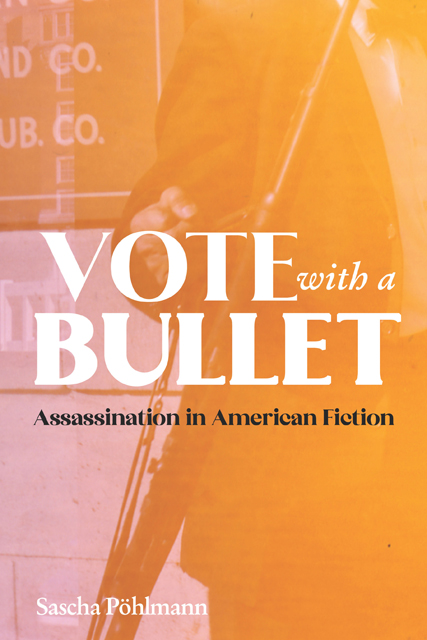Book contents
- Frontmatter
- Dedication
- Contents
- Introduction: The Individual and Society
- 1 The Princess Casamassima (1886)
- 2 The Assassination Bureau, Ltd. (1910/63)
- 3 All the King’s Men (1946)
- 4 Solar Lottery (1955)
- 5 The Manchurian Candidate (1959)
- 6 The Parallax View (1970)
- 7 Libra (1988)
- 8 The Dead Zone (1979)
- 9 11/22/63 (2011)
- 10 Big If (2002)
- 11 Checkpoint (2004)
- 12 The Good Father (2012)
- Conclusion
- Works Cited
- Index
3 - All the King’s Men (1946)
Published online by Cambridge University Press: 14 January 2023
- Frontmatter
- Dedication
- Contents
- Introduction: The Individual and Society
- 1 The Princess Casamassima (1886)
- 2 The Assassination Bureau, Ltd. (1910/63)
- 3 All the King’s Men (1946)
- 4 Solar Lottery (1955)
- 5 The Manchurian Candidate (1959)
- 6 The Parallax View (1970)
- 7 Libra (1988)
- 8 The Dead Zone (1979)
- 9 11/22/63 (2011)
- 10 Big If (2002)
- 11 Checkpoint (2004)
- 12 The Good Father (2012)
- Conclusion
- Works Cited
- Index
Summary
If The Princess Casamassima can be considered one particular beginning of the genre of the assassination novel and The Assassination Bureau, Ltd. an abortive supplement to it, then what it began took quite some time to actually become a noticeable presence in American literature. Another more productive beginning took place more than half a century later with the publication of Robert Penn Warren’s All the King’s Men in 1946. Often considered a classic novel on American politics, All the King’s Men presents the rise and eventual assassination of Governor Willie Stark in an unnamed Southern state in the 1930s. It is told from the perspective of first-person narrator Jack Burden, a former journalist and graduate student who becomes part of his inner circle. Yet the novel is not only a political one: the narrative expands beyond this immediate context and these two main protagonists to create a much more complex network of significance. The political is thus embedded in a larger framework that covers questions of ethics, causality, agency, responsibility, and guilt on a personal as well as a social level. However, the political is not merely incidental to this more expansive exploration of human action and reaction, but it is rather an ideal narrative catalyst for a consideration of the complex processes that govern the lives of individuals in society. As Joseph H. Lane Jr. puts it in his groundbreaking political reading of the novel:
We might say that this work connects politics in the common sense of the word—the activities of running for office and conducting the affairs of government—to politics in a broader sense, that is, the many ways in which our understanding of the world is shaped by the underlying presuppositions of our social and political environments. (826)
In this abstract sense (but notably not in others), one may describe All the King’s Men “as the first significant American novel of the Cold War” (Humphries 172), since it
can be seen as celebrating American conceptions of freedom and individualism while paradoxically presenting a new cultural logic that limits the possibilities of the individual within various containment strategies, including an unquestioned faith in the patriarchal family and an emphasis on political and cultural interpretations that point towards consensus rather than confrontation. (Humphries 174)
- Type
- Chapter
- Information
- Vote with a BulletAssassination in American Fiction, pp. 61 - 72Publisher: Boydell & BrewerPrint publication year: 2021

